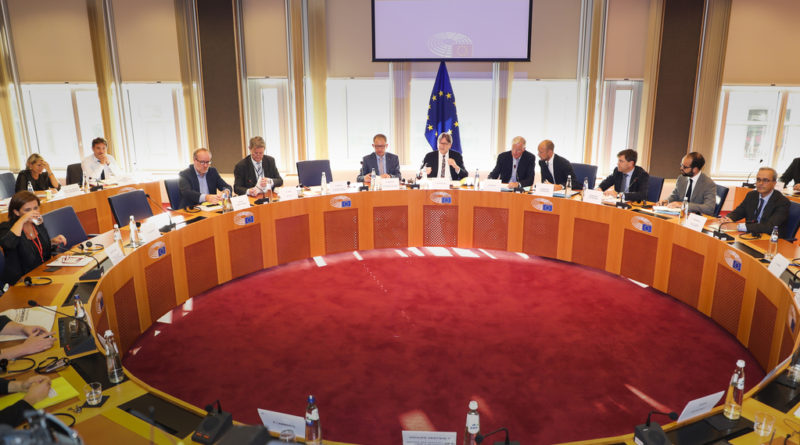Brexit: call for EU parliament ‘special committee’ on citizens’ rights
A group of experts is calling on the European parliament to establish a special committee to assess Brexit impacts on EU citizenship and find a solution for individuals who will lose rights as a result of the UK departure from the EU.
Brexit will have consequences for the status of some 5 million people who have chosen to move across the Channel. This group is about a quarter of all EU citizens who were living in another EU member state in 2017 (17.6 million, according to the EU statistical office Eurostat).
Citizens of Northern Ireland are also impacted, as they are eligible to both UK and Irish (therefore EU) citizenship, but with Brexit they will lose part of their EU rights, for example voting in the European parliament election.
Unless they hold a second EU passport, all UK nationals will also lose EU citizenship the day the country leaves the bloc.
“The real risk that Brexit poses for the European Union was always one about the departure of a member state putting a massive dent in the European project, its values and its strengths, European citizenship being a core achievement of the historical integration process,” the letter says.
“The European parliament has to fill in the gap in protecting EU citizenship,” argue the signatories. Tony Venables and Suzana Carp of the ECIT Foundation, Anthony Simpson of the European Citizen Initiative on permanent EU citizenship, and Alexandra von Westernhagen in a private capacity, call for the creation of an “emergency interparliamentary group” at the European parliament.
This group would look at the “illegality of revoking rights which were accessed legally previously”, at the “continued European citizenship status for all citizens of Northern Ireland,” and at the “irrevocable nature of EU citizenship.” It would also investigate how EU citizenship could “create a dignified way forward” for those losing rights because of Brexit.
The letter was prepared considering that the European Commission acts on the basis of a mandate by EU leaders. But the European parliament, which has made citizens’ rights a priority, can make recommendations as it will have to approve the final Brexit deal.
The European parliament has the power to set up special temporary committees on specific issues. Past temporary committees dealt, for instance, with the Echelon interception system and the EU authorisation procedure for pesticides.
What is EU citizenship
EU citizenship was introduced in 1992 by the Maastricht Treaty as a counterweight to the economic and monetary union. It is considered an evolution of the objective of “an ever-closer union among the peoples of Europe,” stated in the preamble of the Treaty of Rome in 1957.
Besides the right to travel and move anywhere in the EU, EU citizenship gives all nationals of EU member states the right to vote and stand as candidates in European and local elections in the EU country where they live, diplomatic assistance by other EU embassies and consulates, and the right to petition the European parliament.
“With repeated delays leaving people unable for too long to plan the future, negotiators should consider the option of not keeping them hostage any longer and deciding that there should be a lifelong guarantee to keep the existing European rights and citizenship status both for EU citizens in the UK and UK citizens in the EU,” said Tony Venables, director of the ECIT Foundation.
“Like ‘no deal’, ways should be found to remove EU citizenship from the equation,” he added.
Nicolas Hatton, co-founder of the3million, a group defending the rights of EU nationals in the UK, commented: “Five million EU citizens in the UK and Brits in Europe are being stripped of their EU citizens’ rights for no fault of their own. It is time the EU takes citizens’ rights seriously and makes them absolute, so another exit of the Union does not end up with the same awful outcome for citizens.”
More discussion at the European parliament
Last week the constitutional affairs committee of the European parliament decided to invite organisations representing British nationals in the EU and EU citizens in the UK to express their concerns at a hearing on October 8.
On September 12, the new European parliament president and political groups’ leaders will discuss with EU chief negotiator Michel Barnier the state of play in the Brexit process.
Under the withdrawal agreement, most rights of EU nationals in the UK will be preserved, but those of British nationals in the EU will be limited to the country where they reside. Because of the loss of EU citizenship, they will lose the right to move freely elsewhere in the bloc.
In the event of no deal Brexit, the rights of these groups will be decided primarily at the national level, in the country where they live, and possibly later by bilateral agreements. UK citizens in the EU will be subject to EU rules on “third country nationals” which grant some common rights across the EU.
A recent report on no deal Brexit published by the academic consortium UK in a changing Europe warns that “longer-term arrangements for key economic rights – healthcare and social security entitlements, particularly when built up across member states – will take years to resolve,” and that “people that cross borders (for example, those who live in one continental member state but work or conduct business in others) will face a particularly complex set of issues.”
Claudia Delpero © all rights reserved.
Photo by Didier Bauweraerts © European Union 2019 – Source : EP.





